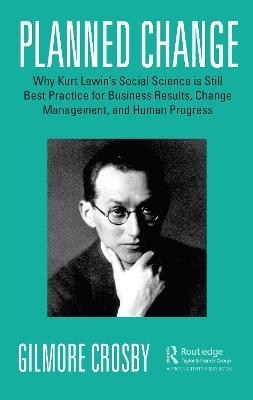
Planned Change
CRC Press (Verlag)
978-0-367-53577-3 (ISBN)
"Gil Crosby has accomplished what most of us in the world of applied behavioral science, in general, and OD and T-Group training, in particular, have not—making the theoretical father of our work accessible. Thus, this book is a gift and with it we can understand more deeply and teach others more accurately what Lewin actually stated and meant. Moreover, the book is reader-friendly, visually appealing, and humorous rather than academically boring. Thank you, Gil!"
Dr. W. Warner Burke
E.L. Thorndike Professor of Psychology and Education
Teachers College, Columbia University
Kurt Lewin (1890-1947) was a visionary psychologist and social scientist who used rigorous research methods to establish an approach to planned change that is both practical and reliable. He mentored and inspired most of the early professionals who came to identify themselves as practitioners of organization development (OD). He also fostered the emergence of the experiential learning method known as the T-group, which uniquely structures group dynamics into a laboratory for dramatic individual and team development. In the early days, most OD professionals learned much about themselves and about group dynamics through T-group experiences.
Lewin’s methods, though little known, yield consistent business results such as increased performance and improved morale. His approaches have the rare impact of not just changing behavior, but changing the beliefs that underlie behavior. Sadly, most OD professionals today— business and organizational leaders, community organizers, and people, in general—have never read any of Lewin’s actual writing beyond a quote or two. Indeed, some in the OD profession have rejected or distanced themselves from what they think Lewin taught, even though they and many others seem to know very little about his methods or history. Because Lewin was a prolific writer, one of the author’s main goals is to organize his immense body of published work so that readers can easily explore the source material and form their own opinions.
Essentially, this book is aimed at introducing Lewin in a new way, both simplified yet substantial enough to guide anyone who is trying to plan change, whether at the individual, group/team, organizational, or societal levels. Lewin was not trying to create methods for OD professionals alone (or for social scientists as he regarded himself). In his interventions, he taught those how to do their own version of planned change. He believed social science might be the light that helps create a brighter future for humanity. This text transfers this knowledge to a broad audience so that each reader can more successfully implement organizational and social change.
Gilmore Crosby is the president of Crosby & Associates. He has expertise in Leadership, Learning, and Organization Development. He has over three decades of experience, including management postions in five organizations. He has deep experience in facilitating performance improvement through initiatives such as coaching and team development (from upper management to the floor), process improvement, assessment methodologies (organizational, team, and individual), conflict resolution, and other OD and change management solutions. Responsible for design, development, and delivery of innovative learning solutions, ranging from individual coaching to accredited leadership development programs.
Introduction I: Lewinian Principles of Planned Change 1: Lewinian Principles of Planned Change II: A Brief Biography 2: The German Years 3: The USA Years III: Methods and Theories 4: A Universal Theory of Social Science 5: Planned Change 6: Group Dynamics and Leadership 7: Social Science and Politics 8: Education, Re-education & Training 9: Social Justice and Change 10: The Birth of the T-group 11: Organization Development IV: Planned Change Now 12: T-groups and OD 13: The Past, Present, and Future of Planned Change APPENDICES Appendix A: The Interpersonal Gap Appendix B: The PECO Nuclear Turnaround Appendix C: KRID Bibliography
| Erscheinungsdatum | 01.09.2020 |
|---|---|
| Zusatzinfo | 25 Illustrations, black and white |
| Verlagsort | London |
| Sprache | englisch |
| Maße | 152 x 229 mm |
| Gewicht | 1020 g |
| Themenwelt | Technik ► Umwelttechnik / Biotechnologie |
| Wirtschaft ► Betriebswirtschaft / Management ► Planung / Organisation | |
| Wirtschaft ► Betriebswirtschaft / Management ► Unternehmensführung / Management | |
| Wirtschaft ► Volkswirtschaftslehre | |
| ISBN-10 | 0-367-53577-7 / 0367535777 |
| ISBN-13 | 978-0-367-53577-3 / 9780367535773 |
| Zustand | Neuware |
| Haben Sie eine Frage zum Produkt? |
aus dem Bereich


